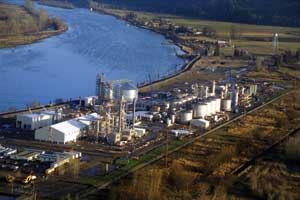E10 mandates in effect, under consideration

February 5, 2008
BY Susanne Retka Schill
One U.S. state implemented an E10 mandate at the start of 2008, while several others are implementing or considering similar policies.
Missouri's E10 mandate took effect Jan. 1 with few problems. "We've been testing samples out in the field, and everyone is complying," said Ron Hayes, fuel quality manager in the Missouri Department of Agriculture Weights & Measures Division. He added that his department filed an emergency rule that relaxed volatility standards and cleared up language on distillation temperature standards that have been in effect for some time.
In anticipation of the mandate, regional pipeline company Teppco Partners LP put its new 50,000-barrel ethanol storage tank into service Jan. 1 at its terminal in Cape Girardeau, Mo. "This will make it more efficient for drivers," said Public Relations Director Rich Rainey. Teppco's terminal in Cape Girardeau is the company's first to have ethanol-blending capability. Teppco has six terminals with truck-loading capability along its Gulf Coast-Midwest pipeline system.
With the mandate in effect, Missouri Gov. Matt Blunt recently proposed to boost E85 usage in the state through a $2 million tax incentive program designed to increase the number of gas stations offering E85. The tax credits would help to offset the cost of modifying pumps—or installing new pumps or tanks—to dispense E85, which can range from $3,000 to $40,000. Blunt also proposed a new state income tax deduction equal to the lesser of $1,500 or 10 percent of the purchase price for consumers who purchase qualifying hybrid vehicles. A third proposed measure is an income tax credit of 25 cents per gallon of E85 purchased in the first year, 20 cents per gallon in years two and three, and 15 cents per gallon in each subsequent year, with a maximum of $500 per taxpayer per year.
On the West Coast, counties in Oregon began implementing the state's E10 mandate in mid-January. Nine counties in northwest Oregon were the first required to meet the mandate by Jan. 15. By the middle of September, all gas stations in the state will be required to offer E10. The Oregon Biofuel Mandate, passed in the 2007 legislative session, requires E10 blends once in-state ethanol production reached 40 MMgy. Pacific Ethanol-Columbia LLC, a 35 MMgy ethanol plant in Boardman, Ore., is currently operating. A second plant, Cascade Grain Products LLC in Clatskanie, Ore., is slated to bring 108 MMgy on line this spring.
In the Southeast, Georgia scheduled a public hearing Feb. 12 to gather feedback for proposed changes to its fuel-blending standards, which may allow for more ethanol usage. In anticipation of Georgia's changes, Eco-Energy Inc. made arrangements with Trimac Transportation Inc. for ethanol storage and handling in Fairburn, Ga. Florida is also making progress with similar adjustments in language and specifications, and in anticipation, Kinder Morgan Inc. is increasing its ethanol storage and handling facilities in that state.
Missouri's E10 mandate took effect Jan. 1 with few problems. "We've been testing samples out in the field, and everyone is complying," said Ron Hayes, fuel quality manager in the Missouri Department of Agriculture Weights & Measures Division. He added that his department filed an emergency rule that relaxed volatility standards and cleared up language on distillation temperature standards that have been in effect for some time.
In anticipation of the mandate, regional pipeline company Teppco Partners LP put its new 50,000-barrel ethanol storage tank into service Jan. 1 at its terminal in Cape Girardeau, Mo. "This will make it more efficient for drivers," said Public Relations Director Rich Rainey. Teppco's terminal in Cape Girardeau is the company's first to have ethanol-blending capability. Teppco has six terminals with truck-loading capability along its Gulf Coast-Midwest pipeline system.
With the mandate in effect, Missouri Gov. Matt Blunt recently proposed to boost E85 usage in the state through a $2 million tax incentive program designed to increase the number of gas stations offering E85. The tax credits would help to offset the cost of modifying pumps—or installing new pumps or tanks—to dispense E85, which can range from $3,000 to $40,000. Blunt also proposed a new state income tax deduction equal to the lesser of $1,500 or 10 percent of the purchase price for consumers who purchase qualifying hybrid vehicles. A third proposed measure is an income tax credit of 25 cents per gallon of E85 purchased in the first year, 20 cents per gallon in years two and three, and 15 cents per gallon in each subsequent year, with a maximum of $500 per taxpayer per year.
On the West Coast, counties in Oregon began implementing the state's E10 mandate in mid-January. Nine counties in northwest Oregon were the first required to meet the mandate by Jan. 15. By the middle of September, all gas stations in the state will be required to offer E10. The Oregon Biofuel Mandate, passed in the 2007 legislative session, requires E10 blends once in-state ethanol production reached 40 MMgy. Pacific Ethanol-Columbia LLC, a 35 MMgy ethanol plant in Boardman, Ore., is currently operating. A second plant, Cascade Grain Products LLC in Clatskanie, Ore., is slated to bring 108 MMgy on line this spring.
In the Southeast, Georgia scheduled a public hearing Feb. 12 to gather feedback for proposed changes to its fuel-blending standards, which may allow for more ethanol usage. In anticipation of Georgia's changes, Eco-Energy Inc. made arrangements with Trimac Transportation Inc. for ethanol storage and handling in Fairburn, Ga. Florida is also making progress with similar adjustments in language and specifications, and in anticipation, Kinder Morgan Inc. is increasing its ethanol storage and handling facilities in that state.
Advertisement
Advertisement
Upcoming Events





